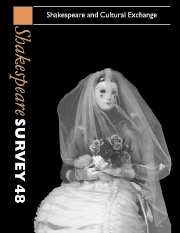Book contents
- Frontmatter
- Shakespeare Translation as Cultural Exchange
- Shakespeare, Theatre Production, and Cultural Politics
- ‘Amphitheaters in the Body’: Playing with Hands on the Shakespearian Stage
- ‘Shakespur and the Jewbill’
- Wilhelm S and Shylock
- Pilgrims of Grace: Henry IV Historicized
- Holy war in Henry V
- Hamlet and the Anxiety of Modern Japan
- Hamlet’s Last Words
- Venetian Culture and the Politics of Othello
- ‘My Music for Nothing’: Musical Negotiations in The Tempest
- The Tempest and Cultural Exchange
- Caliban and Ariel Write Back
- Shakespearian Rates of Exchange in Czechoslovakia 1945–1989
- ‘Are you a Party in this Business?’ Consolidation and Subversion in East German Shakespeare Productions
- The Martyred Knights of Georgian Shakespeariana
- Shakespeare Performances in England, 1993–1994
- Professional Shakespeare Productions in the British Isles, January – December 1993
- 1 Critical Studies
- 2 Shakespeare’s Life, Times, and Stage
- 3 Editions and Textual Studies
- Books Received
- Index
Pilgrims of Grace: Henry IV Historicized
Published online by Cambridge University Press: 28 March 2007
- Frontmatter
- Shakespeare Translation as Cultural Exchange
- Shakespeare, Theatre Production, and Cultural Politics
- ‘Amphitheaters in the Body’: Playing with Hands on the Shakespearian Stage
- ‘Shakespur and the Jewbill’
- Wilhelm S and Shylock
- Pilgrims of Grace: Henry IV Historicized
- Holy war in Henry V
- Hamlet and the Anxiety of Modern Japan
- Hamlet’s Last Words
- Venetian Culture and the Politics of Othello
- ‘My Music for Nothing’: Musical Negotiations in The Tempest
- The Tempest and Cultural Exchange
- Caliban and Ariel Write Back
- Shakespearian Rates of Exchange in Czechoslovakia 1945–1989
- ‘Are you a Party in this Business?’ Consolidation and Subversion in East German Shakespeare Productions
- The Martyred Knights of Georgian Shakespeariana
- Shakespeare Performances in England, 1993–1994
- Professional Shakespeare Productions in the British Isles, January – December 1993
- 1 Critical Studies
- 2 Shakespeare’s Life, Times, and Stage
- 3 Editions and Textual Studies
- Books Received
- Index
Summary
PAST AND PRESENT
R. G. Collingwood once remarked that all historical writing is a selective process governed by a sense of contemporary relevance. Most historical critics who have sought to interpret Shakespeare’s interpretation of the past in 1 and 2 Henry IV seem to have been in agreement with this view. There has, however, been remarkable divergence among both recent and not-so-recent historicists on how the play (I shall use the singular term for convenience’s sake) connects with sixteenth-century practice and ideas; on how, in other words, we should define the context (or larger ‘text’) which makes most sense of its conceptual orientation. E. M. W. Tillyard tied the play to the Tudor, providentialist philosophy of history focused on the Wars of the Roses and the birth of the Tudor dynasty. But he saw in it nothing more specific to sixteenth-century political experience than a large, approving picture of Elizabethan England, rendered vivid by its social and topographical detail. Like Tillyard, Lily B. Campbell read the play as an uncomplicated endorsement of Tudor political orthodoxy; she was much concerned, however, to establish a central analogy with the Northern Rebellion of 1569–70 (an idea first advanced by Richard Simpson in 1874), as well as a number of politically significant parallels between some of the dramatis personae and contemporary individuals.
- Type
- Chapter
- Information
- Shakespeare Survey , pp. 69 - 84Publisher: Cambridge University PressPrint publication year: 1996
- 1
- Cited by

